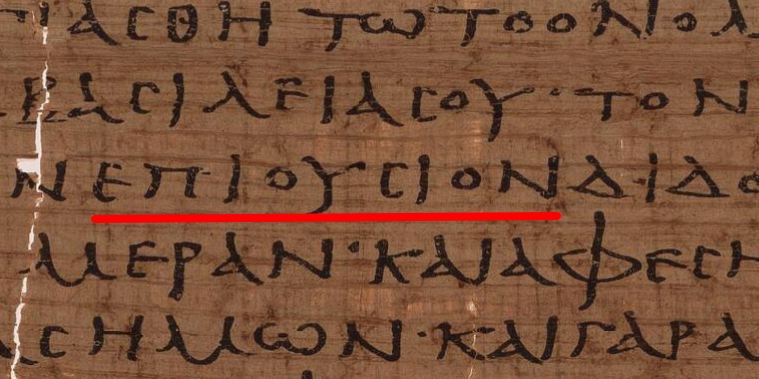the full line being “Give us today our epiousion bread”
Today, most scholars reject the translation of epiousion as meaning daily. The word daily only has a weak connection to any proposed etymologies for epiousion. Moreover, all other instances of “daily” in the English New Testament translate hemera (ἡμέρα, “day”), which does not appear in this usage.[1][2] Because there are several other Greek words based on hemera that mean daily, no reason is apparent to use such an obscure word as epiousion.[4] The daily translation also makes the term redundant, with “this day” already making clear the bread is for the current day.[21]
i don’t think wikipedia mentions this but it has ‘pious’ in the middle



I have only this moment realised that the prayer is referencing the xtian communion giving of bread symbolism, and not just randomly demanding food as if the writer was hungry
Is it, though? Or is it saying “Give us our basic staple needs”? It would be useful if a theologian could chip in on the dates, but I suspect this prayer predates bready communion
From my brief and poorly remembered Christian education, there were at least 3 occasions where the Big J handed out food and drink, and made explicit connection between his god powers, and the catering. So the idea was there in some form from at least the writing of the gospels. But yeah, it would be good to hear from someone who actually knows what they’re talking about.
Historically? All of this is at least disputed. Within the church canon? “[Jesus] broke the bread, gave it to his disciples and said ‘Take this, all of you and eat it, for it is my body, which will be given up for you.’ When [the last] supper had ended he took the cup. Again he gave thanks and praise, gave the cup to his disciples and said 'Take this, all of you, and drink from it. For it is my blood, the blood of the new covenant which will be shed for you and for all so that sin may be forgiven.”
Theologically speaking it’s not a matter of debate at all that communion predates Christ’s death and therefore the founding of the Church or the establishment of the Lord’s prayer.
Communion is the Christianization of the Judaic holiday of Passover. The referenced verses are literally a group of Jews celebrating Passover, on Passover. Not only do the forms of communion predate Christianity, they predate Christ. If you read a few verses before that, possibly depending on which gospel you’re reading, it literally says that.
I’ve heard this as a reference to the bread that was given to the Israelites in the wilderness - manna. In Exodus, the Israelites are instructed to gather and prepare it each day. In the exegesis of that connection, I believe it is Jesus encouraging believers to trust in God for his provision daily.
I thought the mana they are was like… grasshoppers